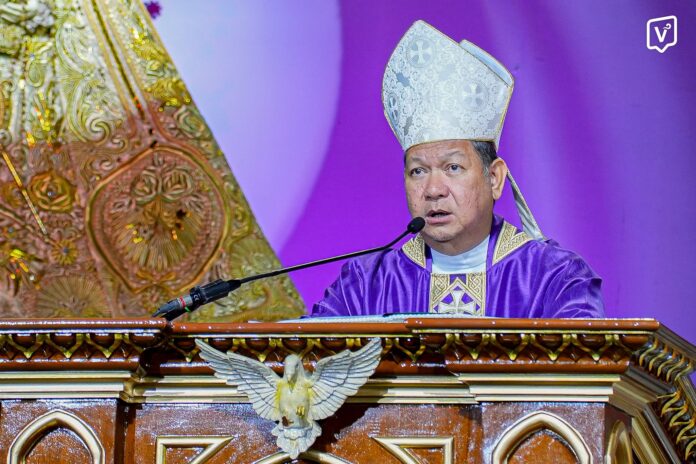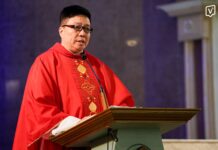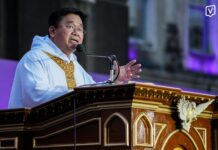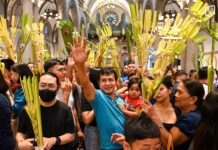
THE USE of preferred pronouns distorts logical thinking and may be considered a new form of oppression brought about by ascendant ideologies, Malolos Bishop Dennis Villarojo told Thomasians on Day 2 of the University-wide Lenten recollection on Wednesday, March 6 at the Quadricentennial Pavilion.
In his homily, which contrasted the theological virtues of faith, hope, and love against critical theory, Villarojo described preferred pronouns as a new “form of entitlement.”
“Take, for instance, the demand to be addressed according to one’s preferred pronouns, regardless of one’s gender,” Villarojo said. “It is a form of oppression that does not only take away your freedom of expression but also your ability to think rightly.”
“How can you think rightly when somebody who looks totally like a man demands to be called ma’am or madame? It twists our logical thinking.”
Amid new ideologies and prevailing belief systems, it is only through the acquisition of the virtues of faith, hope and love, collectively known as “Tria Haec,” that humans can attain peace and adhere to God’s will, Villarojo said.
Tria Haec, which means “these three” in Latin, is portrayed by three statues on top of the Main Building. The statues were crafted by Italian expatriate sculptor Francesco Monti and installed in the early 1950s.
“Faith, hope and love are called theological virtues because they come from God and they direct us to God. God is their source and object,” the bishop said in his homily. “In the theological virtues, we find the antithesis to the world’s angst.”
The Malolos prelate contrasted critical theory’s divisive nature with the virtue of faith, which he said encourages trust to break free from corrupt ideologies like anger, adultery, and fraud.
“Faith…unites us to the spirit of trust, opening our minds to the truth that sets us free. Critical theory offers a utopia that falls, that eventually falls apart, leading us all into despair,” he said.
Villarojo also juxtaposed critical theory’s promotion of self-love and self-indulgence against the virtue of hope, which he said “offers the real possibility of God’s kingdom on earth, a just society based on the rule and cooperation of virtuous men and women.”
The virtue of love, meanwhile, unites humans with God and with one another.
“Tria Haec, these three, perfect the law and make its perfect fulfillment possible. Through them, the lawgiver and law follower become united as one,” he said.
Villarojo added that God’s laws and commandments should not be understood superficially. Drawing from the Gospel of Matthew, he pointed out that the accusations of blasphemy against Jesus illustrated the difference between a good person and a person who merely follows the law.
“The fulfillment of the law does not merely rely on following the rules. It requires formation of the heart,” he said. Sheila May S. Balagan













